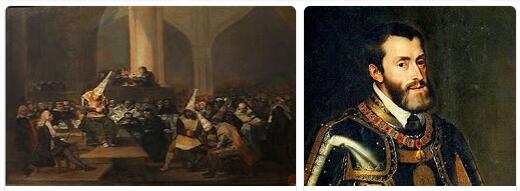At the same time he moved against Elizabeth, who, in contrast to the religious program of the enemy, she had elevated herself as a supporter of all the Protestants of Europe, helped the Huguenots and insurgents of the Netherlands and had sown the seas of daring pirates, first of all the Drake, to annihilate the Spanish trade and plunder the coasts of Chile, of Peru, of Colombia. But an imposing war fleet, which represented the maximum military effort of the greatest naval power of the time and which was supposed to protect the landing of an army destined to strike in its heart the monarchy of Elizabeth, the Armada invencible, was destroyed by the storms of the North Sea without being able to land a man on enemy territory (1588); and its disaster marked the collapse of Spanish dominance over the seas. The conversion to Catholicism of Henry IV destroyed all the plans of Philip II on France, because the new sovereign, having obtained the throne, adhered towards Spain to the policy he had followed as a Huguenot and which, moreover, was traditional for the monarchy. French; in vain the Habsburg took up arms: in the treaty of Vervins (1598) he was forced to recognize him as king and to confirm the conclusions of the peace of Cateau-Cambrésis. Likewise, his plan to unite all of Catholic Europe against Protestant Europe failed. And finally, also the Church, as it had already done with Charles V, and now with stronger reason, it reacted to his attempt to make it an instrument of his politics and ended up going his own way. So that if the weapons of Philip II benefited the cause of Catholicism, the effective direction of the latter and the practical utility of its diffusion also escaped from the hands of the one who had posed as a champion of the Church, the last crusader.
According to VAULTEDWATCHES, the very sad consequences of this policy were seen in the following century, when moreover Spain had monarchs at its head morally and intellectually much inferior to the two who had preceded them: Philip III (1598-1621), Philip IV (1621- 65), Charles II (1669-1700), all three of the Habsburg House, under whom the government passed into the hands of their ministers and their favorites, who not infrequently aggravated the situation of the country with court intrigues.
To Philip III, and for him to the two privados who succeeded the government of the state, Francisco de Sandoval duke of Lerma and his son, but rival, the duke of Uceda, had the task of ending the wars waged by Philip II. In the conflict with England a landing was unsuccessfully attempted on its coasts and an expedition sent to help the Irish Catholics failed to achieve its purpose: the peace was concluded only when James I (1604) ascended the throne, who was especially induced to it by the persuasive word of his friend Don Diego Sarmiento de Acuña count of Godomar, shrewd and skilled Spanish diplomat. Various events had the war in Flanders, which the year before his death, in the vain effort to calm his enemies, worried by the prevalence of Iberian power, Philip II had ceded to his daughter Isabella Clara Eugenia and her husband Albert Archduke of Austria., while placing them under the Spanish protectorate: Alberto was defeated in Nieuport (1602), but on the other hand Federico Spinola took possession of Ostend. However, fatigue and lack of money forced the king to come to terms and sign a truce, in which he effectively recognized the independence of the united provinces. Luck was propitious only in the fight against France, because on the death of Henry IV, an irreducible opponent of Spain, the regent Maria de ‘Medici agreed to the marriage of her son Louis XIII with the infant Anna of Austria and the prince of Asturias. Philip with Isabella, all renouncing, moreover, the rights on the crowns of France and Spain that would have derived from their respective unions. But by now it was just a matter of momentary pauses in the all-out war waged against the Habsburgs by Protestant Germany, once again at odds with the Catholic Empire, by France increasingly determined to overthrow the last remnants of Spanish supremacy, from Holland and from England all intent on supplanting Spain and Portugal in their colonial dominions or at least seizing their wealth. It was always war that he called war; but with these profound differences: that by now it was the enemy who had taken the offensive and was forcing Spain to close in on the defensive and retreat from its positions; and that the conflict was no longer localized to Europe, but had the whole world as its theater, legalized the largest smuggling in history before the continental blockade, led to the creation of the Dutch, English, French colonial empires, and in one way or another upset the Spanish colonial policy which had hitherto rested on the exclusivity of possession and traffic.
